
Bible Verse and Prayer for Today;
These things I have spoken unto you, that in me ye might have peace. In the world ye shall have tribulation: but be of good cheer; I have overcome the world.
John 16:33
Prayer
Lord. Thank you for reminding us that one day the problems and tribulations of this world will end and we will be able to move on to a world of peace and tranquility. Thank you for the New Earth and the New Universe that will be sinless, which you have created. We thank you, the Creator of all, in the Name of Jesus. Amen and Amen.
Bybel Vers en Gebed vir Vandag
Dit het Ek vir julle gesê, sodat julle in My vrede kan hê. In die wêreld sal julle verdrukking hê, maar hou goeie moed; Ek het die wêreld oorwin.
Johannes 16:33
Gebed
Here. Dankie dat U ons daaraan herinner dat hierdie wêreld se probleme en verdrukkinge eendag sal ophou en ons sal kan aanbeweeg na ‘n wêreld van vrede en rustigheid. Dankie vir die Nuwe Aarde en die Nuwe Heelal wat sondevry sal wees, wat U geskep het. Ons dank U, die Skepper van alles, in die Naam van Jesus. Amen en Amen.

Bible Teaching of the Day
Stolen Water is Sweet
Wisdom literature often employs metaphorical language to instruct the reader about delicate subjects like married love and sexual relations. The idea that “stolen water is sweet” (Proverbs 9:17) refers to forbidden sexual indulgence.
Using personification, Solomon contrasts wisdom with folly. Both wisdom and folly are like women who invite passing guests into their homes for a feast. The person who accepts wisdom’s invitation makes the critical choice that leads to life: “Come, eat of my bread and drink of the wine I have mixed. Lay aside immaturity, and live, and walk in the way of insight” (Proverbs 9:5–6; cf. John 6:51–56). However, the person who accepts folly’s invitation chooses a path that leads to death (Proverbs 9:18; cf. Romans 8:6).
Earlier, in Proverbs 5:1–23, Solomon warns the young man against adultery. He compares water to physical intimacy: “Drink water from your own cistern, running water from your own well. Should your springs overflow in the streets, your streams of water in the public squares? Let them be yours alone, never to be shared with strangers. May your fountain be blessed, and may you rejoice in the wife of your youth” (Proverbs 5:15–18).
Water was an apt and meaningful illustration in the desert-like conditions of ancient Jerusalem. Keeping a clean and fresh water supply was crucial to sustaining life. Rainwater was collected and stored in hollowed out rocks or underground cisterns lined with plaster-like limestone to prevent them from leaking. Due to the scarcity of rainfall, these cisterns had to be carefully maintained and guarded. Drinking from one’s own private water supply was much preferred over transporting water from a public well or stream.
God builds a wall around marital intimacy, ordaining marriage and the marriage bed as a private and exclusive “fountain” or “spring” for the enjoyment of sexual pleasure. No one but a man and woman joined in marriage are to drink water from this fountain or share in its joy (Exodus 20:14; Leviticus 18:20). In Proverbs 9:17, Solomon uses the idea of “stolen water” as an allusion to illicit, forbidden, extramarital sex.
Stolen water is taken from someone else’s fountain. It is sexual pleasure outside the bounds of what is lawful and proper. Water from one’s own fountain is pure, clean, and refreshing, but stolen water, no matter how sweet it may seem at the time, is polluted by sin. So, what is it about stolen water that makes it so sweet?
For some, the thrill of getting away with something unlawful—the dangerous and secret aspect of an affair, for example—excites and appeals to their baser instincts. The sinful nature craves what it cannot have (Galatians 5:17; Romans 7:14–23). The more prohibited something is, the more tempting and desirable it becomes. In the New Living Translation, Proverbs 9:17 suggests, “Stolen water is refreshing; food eaten in secret tastes the best!” Both “stolen water” and “food eaten in secret” imply forbidden and covert activities.
Nevertheless, in Proverbs 20:17, Solomon warns, “Stolen bread tastes sweet, but it turns to gravel in the mouth” (NLT). The pleasantness of sinful pleasure is short-lived and misleading (Ecclesiastes 2:10–11; Hebrews 11:25; 1 Timothy 5:6). What was initially sweet on the tongue quickly turns to bitterness and death once swallowed (Isaiah 5:20). Folly’s invitation may look and sound attractive. The bread and water she offers may taste sweet, but, eventually, death awaits those who walk through her door (Proverbs 9:18).
God designed physical intimacy not just for the reproduction of human life but for the refreshment and pleasure of couples joined in the covenant bond of marriage (Genesis 1:28; 2:18, 23–24; Matthew 19:4–6; 1 Corinthians 7:32–34; Song of Solomon 4:16—5:1, 19). Sex is God’s gift to strengthen a married couple’s emotional bond. According to Solomon, sexual intimacy within the appropriate bounds of marriage is like a delicious mouthful of pure spring water. But committing adultery is like ingesting polluted water. Stolen water may seem sweet, but it’s like slurping deadly poison from a sewer. Sex outside of marriage may be exciting and enjoyable initially, but it eventually defiles and destroys everyone who partakes of it (Proverbs 6:20–35).
Bybel Lering vir die Dag
Gesteelde water is Soet
Wysheidsliteratuur gebruik dikwels metaforiese taal om die leser oor delikate onderwerpe soos huweliksliefde en seksuele verhoudings te onderrig. Die idee dat “gesteelde water soet is” (Spreuke 9:17) verwys na verbode seksuele toegewing.
Deur personifikasie te gebruik, kontrasteer Salomo wysheid met dwaasheid. Beide wysheid en dwaasheid is soos vroue wat verbygaande gaste na hul huise nooi vir ‘n feesmaal. Die persoon wat wysheid se uitnodiging aanvaar, maak die kritieke keuse wat tot die lewe lei: “Kom, eet van my brood en drink van die wyn wat ek gemeng het. Lê onvolwassenheid af en lewe, en wandel op die weg van insig” (Spreuke 9:5–6; vgl. Johannes 6:51–56). Die persoon wat dwaasheid se uitnodiging aanvaar, kies egter ‘n pad wat tot die dood lei (Spreuke 9:18; vgl. Romeine 8:6).
Vroeër, in Spreuke 5:1–23, waarsku Salomo die jongman teen egbreuk. Hy vergelyk water met fisiese intimiteit: “Drink water uit jou eie reënbak, lopende water uit jou eie put. Mag jou fonteine in die strate oorloop, jou waterstrome op die pleine? Laat hulle joune wees, moenie met vreemdelinge gedeel word nie. Mag jou fontein geseënd wees, en mag jy juig oor die vrou van jou jeug” (Spreuke 5:15–18).
Water was ‘n gepaste en betekenisvolle illustrasie in die woestynagtige toestande van antieke Jerusalem. Om ‘n skoon en vars watervoorraad te handhaaf, was noodsaaklik vir die onderhou van lewe. Reënwater is opgevang en gestoor in uitgeholde rotse of ondergrondse reënbakke wat met pleisteragtige kalksteen uitgevoer is om te verhoed dat hulle lek. As gevolg van die skaarste aan reënval, moes hierdie reënbakke versigtig onderhou en bewaak word. Om uit jou eie privaat watervoorraad te drink, was baie verkieslik bo die vervoer van water uit ‘n openbare put of stroom.
God bou ‘n muur om huweliksintimiteit en orden die huwelik en die huweliksbed as ‘n private en eksklusiewe “fontein” of “bron” vir die genot van seksuele plesier. Niemand behalwe ‘n man en vrou wat in die huwelik verbind is, mag water uit hierdie fontein drink of in die vreugde daarvan deel nie (Eksodus 20:14; Levitikus 18:20). In Spreuke 9:17 gebruik Salomo die idee van “gesteelde water” as ‘n verwysing na ongeoorloofde, verbode, buite-egtelike seks.
Gesteelde water word uit iemand anders se fontein geneem. Dit is seksuele plesier buite die grense van wat wettig en gepas is. Water uit ‘n mens se eie fontein is suiwer, skoon en verfrissend, maar gesteelde water, maak nie saak hoe soet dit op daardie tydstip mag lyk nie, is besoedel deur sonde. So, wat is dit omtrent gesteelde water wat dit so soet maak?
Vir sommige prikkel en appelleer die opwinding om met iets onwettigs weg te kom – die gevaarlike en geheime aspek van ‘n verhouding, byvoorbeeld – hul laer instinkte. Die sondige natuur smag na wat dit nie kan hê nie (Galasiërs 5:17; Romeine 7:14–23). Hoe meer verbode iets is, hoe meer aanloklik en begeerlik word dit. In die Nuwe Lewende Vertaling stel Spreuke 9:17 voor: “Gesteelde water is verfrissend; kos wat in die geheim geëet word, smaak die beste!” Beide “gesteelde water” en “kos wat in die geheim geëet word” impliseer verbode en geheime aktiwiteite.
Nietemin waarsku Salomo in Spreuke 20:17: “Gesteelde brood smaak soet, maar dit verander in gruis in die mond” (NLT). Die aangenaamheid van sondige plesier is kortstondig en misleidend (Prediker 2:10–11; Hebreërs 11:25; 1 Timoteus 5:6). Wat aanvanklik soet op die tong was, verander vinnig in bitterheid en dood sodra dit ingesluk word (Jesaja 5:20). Dwaasheid se uitnodiging mag aantreklik lyk en klink. Die brood en water wat sy aanbied, mag soet smaak, maar uiteindelik wag die dood op diegene wat deur haar deur stap (Spreuke 9:18).
God het fisiese intimiteit nie net ontwerp vir die voortplanting van menslike lewe nie, maar vir die verkwikking en plesier van paartjies wat in die verbondsband van die huwelik verbind is (Genesis 1:28; 2:18, 23–24; Matteus 19:4–6; 1 Korintiërs 7:32–34; Hooglied 4:16–5:1, 19). Seks is God se geskenk om ‘n getroude paartjie se emosionele band te versterk. Volgens Salomo is seksuele intimiteit binne die toepaslike grense van die huwelik soos ‘n heerlike mondvol suiwer fonteinwater. Maar om egbreuk te pleeg is soos om besoedelde water in te neem. Gesteelde water mag soet lyk, maar dis soos om dodelike gif uit ‘n riool te slurp. Seks buite die huwelik mag aanvanklik opwindend en aangenaam wees, maar dit verontreinig en vernietig uiteindelik almal wat daaraan deelneem (Spreuke 6:20–35).

Today’s Devotional
Stay Low up to a Point
Romans 12:2 (Message translation) Don’t become so well-adjusted to your culture that you fit into it without even thinking. Instead, fix your attention on God. You’ll be changed from the inside out. Readily recognize what he wants from you, and quickly respond to it. Unlike the culture around you, always dragging you down to its level of immaturity, God brings the best out of you, develops well-formed maturity in you.
Often, when I look at Christianity today, I can’t help but to think that we have allowed Christianity to become more like the World than to be an influence to a lost and dying World. Instead of bringing in lost souls into the church and Christianity, we have seen the church compromising on sound doctrine and Godly truth to become accepted in the World.
But this is not a “modern day” phenomena. Charles Spurgeon once said: “Certain ministers are treacherously betraying our holy religion under pretense of adapting it to this present age. The new plan is to assimilate the church to the world by semi-dramatic performances they make the house of prayer to approximate to the theater; they turn their services into musical displays in fact, they exchange the temple for the theater, and turn the ministers of God into actors, whose business it is to amuse men. This then is the proposal. In order to win the world, the Lord Jesus must conform himself, his people, and his Word to the world. I will not dwell on so loathsome a proposal.”
Indeed I too have said that we should do as much as we can to bring in the lost, but we should not do this at any cost. We cannot adapt to the World and worldly concepts, merely to fill a church. Yes, we need to be tolerant, we need to be patient while reaching out to sinners, but we are not to approve of their lifestyles by word or by omission. And I have seen that omission of truth is often the cornerstone on which many a church is built. Our silence on various matters shouts our approval. We cannot allow continual sinful behavior, simply because God loves the Sinner. It is because of God’s love for sinners that we need to expose and deal with sin.
My fellow ministers, I too have made mistakes. There were times I knew what I was to do. And even in spite of this knowledge and the conviction by God’s Holy Spirit I have not done what is Godly and just. Instead of addressing matters, I kept silent. Instead of saying “thus sayeth the Lord” I kept quiet. And in omitting the truth, in not preaching the Word, I have become an accomplice in sin. I have become as guilty as those I have not spoken to. For this I asked the Lord’s forgiveness.
What are we to do? We need to stay low, hear what the Lord is saying. But when the time comes or when the need arise, we need to boldly take a stand and speak up. Let us not compromise, for in doing so, we are indeed robbing the church of God’s truth and holiness.
Vandag se Bemoediging
Bly Laag tot op ‘n Punt
Romeine 12:2 (Boodskapvertaling) Moenie so goed aangepas raak by jou kultuur dat jy daarin inpas sonder om eers te dink nie. Rig eerder jou aandag op God. Jy sal van binne na buite verander word. Herken geredelik wat Hy van jou wil hê, en reageer vinnig daarop. Anders as die kultuur rondom jou, wat jou altyd afsleep na sy vlak van onvolwassenheid, bring God die beste uit jou, ontwikkel goed gevormde volwassenheid in jou.
Dikwels, wanneer ek vandag na die Christendom kyk, kan ek nie anders as om te dink dat ons toegelaat het dat die Christendom meer soos die Wêreld word as om ‘n invloed op ‘n verlore en sterwende Wêreld te wees nie. In plaas daarvan om verlore siele in die kerk en die Christendom in te bring, het ons gesien hoe die kerk kompromieë aangaan oor gesonde leer en Goddelike waarheid om in die Wêreld aanvaar te word.
Maar dit is nie ‘n “moderne” verskynsel nie. Charles Spurgeon het eens gesê: “Sekere predikante verraai ons heilige godsdiens verraderlik onder die voorwendsel dat hulle dit by hierdie huidige era aanpas. Die nuwe plan is om die kerk met die wêreld te assimileer deur semi-dramatiese opvoerings – hulle maak die huis van gebed nader aan die teater; hulle verander hul dienste in musikale vertonings, hulle verruil die tempel vir die teater en verander die predikante van God in akteurs wie se taak dit is om mense te vermaak. Dit is dan die voorstel. Om die wêreld te wen, moet die Here Jesus Homself, sy mense en sy Woord aan die wêreld gelykvormig maak. Ek sal nie by so ‘n afskuwelike voorstel stilstaan nie.”
Inderdaad, ek het ook gesê dat ons soveel as moontlik moet doen om die verlorenes in te bring, maar ons moet dit nie ten alle koste doen nie. Ons kan nie by die wêreld en wêreldse konsepte aanpas nie, bloot om ‘n kerk te vul. Ja, ons moet verdraagsaam wees, ons moet geduldig wees terwyl ons na sondaars uitreik, maar ons moet nie hul lewenstyle deur woord of deur weglating goedkeur nie. En ek het gesien dat die weglating van waarheid dikwels die hoeksteen is waarop menige kerk gebou word. Ons stilswye oor verskeie sake skree ons goedkeuring uit. Ons kan nie voortdurende sondige gedrag toelaat nie, bloot omdat God die sondaar liefhet. Dit is as gevolg van God se liefde vir sondaars dat ons sonde moet blootlê en daarmee moet handel.
My mede-predikante, ek het ook foute gemaak. Daar was tye wat ek geweet het wat ek moes doen. En selfs ten spyte van hierdie kennis en die oortuiging deur God se Heilige Gees, het ek nie gedoen wat Goddelik en regverdig is nie. In plaas daarvan om sake aan te spreek, het ek stilgebly. In plaas daarvan om te sê “so sê die Here” het ek stilgebly. En deur die waarheid weg te laat, deur nie die Woord te verkondig nie, het ek ‘n medepligtige in sonde geword. Ek het net so skuldig geword soos diegene met wie ek nie gepraat het nie. Hiervoor het ek die Here se vergifnis gevra.
Wat moet ons doen? Ons moet stilbly, hoor wat die Here sê. Maar wanneer die tyd aanbreek of wanneer die nood ontstaan, moet ons met vrymoedigheid ‘n standpunt inneem en ons stem laat hoor. Laat ons nie kompromieë aangaan nie, want deur dit te doen, beroof ons inderdaad die kerk van God se waarheid en heiligheid.

TruLight Ministries Daily Entertainment

TruLight TV – Popcorn & Movie Time – Camp Harlow
Camp Harlow tells the moving story of Alex, a teenage bully who spends her time lashing out at classmates and making their lives as miserable as she possibly can. Only when Alex has a chance encounter at a local Christian summer camp, does she finally receive the wake-up call she so desperately needs. But will it be enough to truly turn her life around or will she just return to her bullying ways once camp is over? Camp Harlow is a touching story of redemption and hope. A faith-based drama and a gentle reminder that there is no soul beyond the saving reach of God’s love.
INTRODUCTION TO THE GOSPEL ARTISTS
MEET : Jackie Harling

Having a father in the Gospel Music industry gave little Jackie Newton (Harling) a directed path to stardom. As she grew up being pruned for the music business, her life would take a turn and Jackie bowed out of becoming a star.
Born in Western Kentucky in the city of Murray, Jackie grew up listening to the awe-inspiring melodies resonating from her Hall of Fame father Calvin Newton. Calvin has been a professional gospel singer since he was a teenager and sang with various gospel groups such as the Blackwood Brothers, the Sons of Song and the Oakridge Quartet (before they became the Oakridge Boys). Jackie’s mother Joyce had trained to be a concert pianist, but while raising her family she chose to accompany her husband’s endeavors as he recorded his music and also began touring with the well-known family of gospel, the Gaithers.
Jackie and her older brother Wes grew up in a time without iPods, iPads or even cable television so they filled their time with music traveling to different churches with the Gospel groups their family was a part of.
“That was what I did with my weekends. I can just imagine how my 12-year-old would react if I told her we were going to churches to sing over the weekend,” Jackie laughs, “but I loved it and spent good, quality time with my family.”
The Newtons moved to Pulaski, Tennessee for a few years to live closer to Joyce’s parents, but when Joyce was offered a job with the city of Chattanooga where Calvin’s parents lived, they decided to relocate and remain here.
“I have always loved the music that my dad recorded on an 8-track. There was a song that Elvis did called the Trilogy. Glory, Glory Hallelujah…” Jackie sings, “and Daddy recorded a version of that song and Ray Stevens produced it. Ray and his wife sang back-up and it was so good. I wanted to listen to it all the time.”
Jackie credits learning to sing just from listening to her dad, but at age 10 she was instructed on singing harmony and, after the first lesson she could pick up harmony by ear.
As Jackie got older, she listened to other artists and WDOD Radio’s DJ Jerry Pond would give her free albums to listen to.
“There was a lot of boredom that needed to be filled and it occupied my time and gave me joy. I listened to Barbara Streisand, Elvis and the Moody Blues and …Pat Boone,” Jackie chuckles.
There are numerous videos on Youtube of Calvin singing with the Sons of Song, the Blackwood Brothers and more as well as a biography out called “Bad Boy of Gospel Music: The Calvin Newton Story” by Russ Cheatham in which Calvin shares his redemption journey.
When Jackie was a young girl, she tried to write a few songs but put the idea away until she was an adult.
Jackie met her husband Keith Harling at a recording studio where he was playing the saxophone and she was singing back-up vocals. She was just 16 years old, but after dating for three years the two married.
Jackie had been managed by Harland and Scarlett Adams. Harland was the grandson of the late Colonel Sanders. The couple never had children and took Jackie under their wings as they would have a beloved child of their own.
With her bold, yet honeyed voice and her outgoing personality, Jackie had been primed for the stage, but when the time came to take her music career farther and move to California, Jackie had a change of heart.
“What interrupted that plan was meeting my husband, which I am very glad it did. A lot of people in the entertainment industry can be successful, but not happy. You can see so much that takes away your innocence and your ability to be happy. I am really thankful that I didn’t make that move,” Jackie says.
Soon after the couple married, Keith, who had mostly worked in his family’s small businesses of upholstery and interior design, told his new bride that he wanted to try his hand as a singer/songwriter in Country music.
With Jackie growing up in the music scene and Keith was surrounded by a family of small business owners, the couple ironically traded careers.
Keith had been running a business selling blinds and Jackie wanted to step off the stage and help her husband in his business and be what she calls ‘a normal wife’.
“I felt safer in that supportive role. Being on stage really puts you in a vulnerable place. I can’t help but to want people to like me and being in the spotlight, you leave yourself open to criticism and I was uncomfortable with that. I was no longer happy being the center of attention,” Jackie says. “Now, people don’t know me as Jackie Harling as much as they know me as Calvin’s daughter, Keith’s wife or Samantha’s mom …and I am really comfortable with that.”
Keith began working on his music, while on the side he was doing the work in what he was groomed to do.
“Keith had gotten a record deal on a country label called MCA – the same label George Strait was with and, it was kind of a big deal. In ’98 Keith had a pretty big hit called ‘Papa Bear’ that he sang and wrote. I helped him with his music and helped write his songs. Over the years he has gotten better and better at it – we both have. Writing with him is my favorite thing to do,” Jackie says.
Though it took years for Keith to get a record deal, once his song became a hit life was a whirlwind and success came quickly as Keith started touring.
Three years after Keith’s music career took off the couple had their daughter Samantha and the music industry was changing. As online music became available it was being stolen and several recording studios had to close their doors.
“It was a very rough time for new artists,” Jackie insists. “It was really a miracle for him to achieve the success that he got at that time. He was the highest debuting artist in that year and was shooting straight for the top.”
When Universal and MCA merged a lot of changes happened in the music business. The entire label of DECCA (Dolly Parton’s label) was shut down and over 3,000 people lost their jobs.
Several clients with MCA and across the board lost record deals and Keith hadn’t had time to build on his new success and lost his deal in that merger.
Keith then signed with Giant Records, a label Neil McCoy and Clay Walker were with, and worked hard on his new album, but before that record could be released the label closed its doors.
“We started to sense a trend that no matter how hard we worked, or how good we were at what we did (and to be ethical in the way we did it) there just didn’t seem to be a lot of job security in the music business at that time,” Jackie says.
Undoubtedly discouraged and with a baby on the way, the couple had a back-up plan and in 2001 they launched their window covering business The Blind Express.
Though Jackie was happy in her supportive role in the music business, she was just as happy helping to run a business and having some down time to focus on family and what was most important to her.
Keith had played at Riverbend on the Coca-Cola stage in 2000 and that year, Jackie got to know the executive director of Friends of the Festival Chip Baker and convinced him to have a tent for pet adoption for the next festival.
“I love animals and have a big passion for them. I was on the board of directors for the Humane Society for seven years and we had just hired Guy Bilyeu as director and he really turned it around, but he recently passed away from injuries in a bicycle accident,” Jackie says regretfully.
The first year that Riverbend held the ‘adopt-a-pet’ tent drive, 45 animals were placed in homes and there has been a pet adoption tent ever since and has proved successful.
When the couple began their window covering business the after effects of 9/11 were prevalent, but they didn’t let that discourage them.
“This is what Keith was doing before he got into the music business so it wasn’t like we were going into something ‘blind’,” Jackie puns.
“But the latest recession of 2008 we DID notice … oh my word. Needless to say, our spiritual life is very strong, “Jackie laughs. “We have a lot of faith and we have had a lot of miracles in our lives. A business surviving that time is a miracle in itself, but that’s where ‘blind faith’ comes through. We really live by faith. So many bad things could have happened that didn’t.”
Shortly after Samantha was born, Jackie found out she had PVC’s with her heart beat. Her heart would skip every third beat and try to catch up so she felt the butterfly-flutter feeling in her chest.
Medication didn’t seem to help and actually made Jackie feel worse, so her cardiologist suggested surgery to ablate the extra nerve in her heart.
“Two days before my surgery, I was really worrying about it and thinking of the possible risks involved – especially with having a little girl. It wasn’t a major surgery like a by-pass, but I was still concerned,” Jackie says.
She was in Nashville taping a Gaither Friends special. At the close of the show, the group always gathers for prayer and Jackie shared with her friend Sonya Isaacs that she would like prayer concerning her heart condition.
“Sonya was praying for my heart to be healed. She had tears and it was a long prayer and I felt the urge to pray with her. After making the video we went home and I felt really bad – like a weight on my chest and it was hard to breath and I had a burning pressure. I was terrified that I was going to have a heart attack and the next day, I went to have my operation they put a heart cath in and hooked me up to everything and my heart was not skipping. They put me in the surgery room and pumped me full of medicine that was supposed to induce my heart to skip – and nothing they could do would make my heart skip. I was grinning like an absolute idiot! I knew what had happened,” Jackie says triumphantly.
“With it being a Christian hospital the doctors knew too, and were saying, ‘We’ve seen this before… you have had a miracle.’ I couldn’t keep from smiling and that incident changed our lives,” Jackie says.
At first, she was afraid that if she did one wrong thing, that God would ‘take back’ His miracle, but Jackie realized that God would not receive glory in doing that found peace knowing He healed her because He wanted to – not from anything she had done.
With the ups and downs of their music career and the recessions their window covering business faced; when Jackie received healing of her heart and had no problems with it since, she and Keith have a much stronger faith than ever before.
“The love thy neighbor verse is what my husband and I live by – it comes naturally for us to love people and help them. We like to serve people and their needs. Whenever God puts someone in my life, I try to make things better for that person,” Jackie says. “You don’t have to be up on the stage to affect the lives of people and that gives me purpose.”
Today on TruLight Radio XM

ruLight Radio XM 24/7
Program
GMT / UTC +2
00:15 Words to Live By Testimonies
01.15 Science Scripture and Salvation
02.15 Ground Works
04.00 Gospel Concert of the Day
05.00 The Daren Streblow Comedy Show
5:55 It is Today devotional
6:00 Gaither Homecoming Morning Show
7:15 Discover the Word
8.15 Destined for Victory
8:55 Science Scripture and Salvation
9:00 Holy Spirit Hour – Normally Sermons
10:15 Hope of the Heart
11:15 Unshackled
11.45 Words to Live By
12:15 Truth for Life
13:15 Living on the Edge with Chip Ingram
14:15 Focus on the Family
15:00 Kids Hour
16:00 In Touch with Dr. Charles Stanley
16:30 Groundwork
17:15 Live in the Light
18:15 Renewing your Mind
19:00 Gaither Homecoming Show
20:15 Growing Hope
21:15 Adventures in Odyssey Radio Drama
21:45 Bible Reading
22:15 Night-sounds
23.00 Good Old Country Gospel / Rhema Gospel Express
VISIT THE WEBSITE
https://TruLightRadioXM.org.za

Signs of the Times
Israel readying to strike Iran’s nuclear sites, says US Intel

US intelligence sources have observed “indications” that Israel may be preparing to strike Iran’s nuclear facilities, as Washington and the Islamic Republic engage in the fifth round of negotiations aimed at achieving a deal to curb Tehran’s nuclear development program.
The report did not provide extensive details on how US intelligence had come to that conclusion, beyond noting the movement of munitions and the completion of a recent aerial exercise by Israel, but senior Western officials told CNN that the likelihood of an Israeli strike had grown.
“The chance of an Israeli strike on an Iranian nuclear facility has gone up significantly in recent months,” a source familiar with the intelligence report told CNN. “And the prospect of a Trump-negotiated US-Iran deal that doesn’t remove all of Iran’s uranium makes the chance of a strike more likely.”
However, some stressed that Israel would be wary of taking bold military action that would embarrass Washington on the world stage.
“At the end of the day, the Israeli decision-making is going to be predicated on US policy determinations and actions, and what agreements President Trump does or does not come to with Iran,” Jonathan Panikoff, a former senior intelligence official specializing in the Middle East, told CNN.
Panikoff added that he doubted Netanyahu would carry out a strike on Iran without US approval, due to concerns about damaging Israel’s relationship with the Trump administration.
Some intelligence officials told CNN that the indications suggesting Israel is readying an attack on Iran could also simply be Jerusalem flexing its muscles, in an attempt to pressure Tehran into a diplomatic agreement with the US regarding its nuclear activity.
Although Trump has said that Iran must “act fast” regarding securing a deal, it’s unclear how long the negotiations will continue between the two countries.
Gog and Magog Update
‘I Did it for Gaza’;Terrorist Executes 2 Israeli Embassy Staffers in DC; – Trump Reacts to Murder; – Killer Shouted ‘Free Palestine’

Last night, in a devastating act of antisemitic violence, two dedicated Israeli embassy staff members, Yaron Lischinsky and Sarah Milgrim, were fatally shot outside the Capital Jewish Museum in Washington, D.C. They were not only dedicated diplomats serving the State of Israel, Yaron and Sarah were a couple, planning to get engaged next week in Jerusalem. Their tragic loss shook the entire global Jewish community. May their memory be a blessing.
The attacker, who shouted “Free, Free Palestine!” as he opened fire and stormed into the museum, committed a vile attack of terror. His act targeted more than just two lives, it was aimed at everything we stand for: peace, dignity, and the shared values of our people. He was apprehended at the scene.
This tragedy is a stark reminder of the dangers faced daily by Israeli diplomats and Jewish communities worldwide. Yaron and Sarah were ambassadors for our nation, working for a safer Israel, more hopeful future for our people.
In their memory, and in defiance of the hatred that took them from us, we ask you to stand with us. Zaka Tel-Aviv responds to tragedy with compassion, urgency, and action. Your support ensures we can continue our life-saving work in the face of terror and rising antisemitism.
Netanyahu Vows Final Victory in Gaza as IDF Defends Israel from Houthi Missiles and Eliminates Terrorist Behind Fatal Attack

Netanyahu reaffirmed his commitment to achieving a decisive victory in Gaza as the IDF continues to target Hamas. Meanwhile, Israel’s defense systems intercepted multiple missiles from the Houthi rebels, while the IDF successfully eliminated the terrorist responsible for the recent killing of Tzeela Gez.
Places in the Bible
Sea of Galilee
Also known as Bahr Tubariya, Ginnosar, Lake of Galilee, Lake of Gennesaret, Lake of Gennesar, Sea of Chinnereth, Sea of Chinneroth, Sea of Kinnereth, Sea of Tiberias, Lake of Tiberias, Waters of Gennesaret, Yam Kinneret
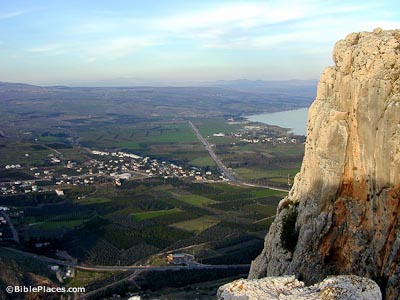
Plain of Gennesaret
The Plain of Gennesaret spreads out below the Arbel cliffs. About 5 miles (8 km) long and 2 miles (3 km) wide, this stretch of land alongside the Sea of Galilee’s northwest shore was renowned for its fertility. Josephus wrote that it was “wonderful in its characteristics and in its beauty. Thanks to the rich soil there is not a plant that does not flourish there, and the inhabitants grow everything: the air is so temperate that it suits the most diverse species.”
View from Northwest
The Sea of Galilee is fed by the Jordan River, rainfall and springs on the northern side. More properly designated a lake, the Kinneret (the Old Testament and modern name) is 13 miles (21 km) long and 7 miles (11 km) wide. At its deepest point, the lake is only 150 feet (45 m) deep. The rabbis said of it, “Although God has created seven seas, yet He has chosen this one as His special delight.”
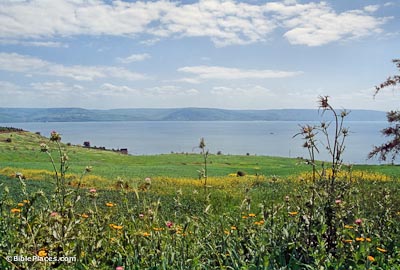

View from Arbel
From the summit of Mount Arbel on the western side of the Sea of Galilee, one can see the entire lake, the city of Tiberias, the mountains of Galilee, and the Golan Heights. On a clear day, Mount Hermon is visible.
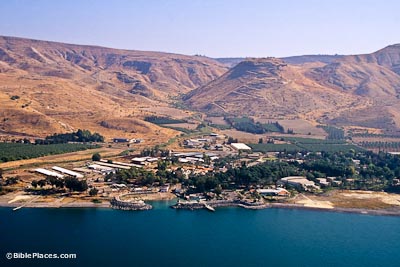
Hippos and Harbors
Hippos (Susita) was a major city of the Decapolis located on a round hill overlooking the shore. The modern harbor of Kibbutz En Gev is visible below it. In the 1st century, at least 16 harbors were located on the lake. All the lake’s settlements had their own harbor, even if it was very small. The largest one belonged to Gadara had a 650-foot (200-m) breakwater.
Wooden Boat Reconstruction
In 1986, a wooden vessel from the first century was discovered near Nof Ginosar on the lake’s northwestern shore. Studies have determined the type of wood that was used (mainly cedar and oak), the style of construction (mortise and tenon joints), the date (on the basis of construction techniques, pottery, and Carbon 14 tests) and the size (26 x 7 ft [42×8 m] – big enough for 15 men). Pictured at right is a reconstruction of how the ancient boat might have looked. This was formerly on display at Kibbutz En Gev.
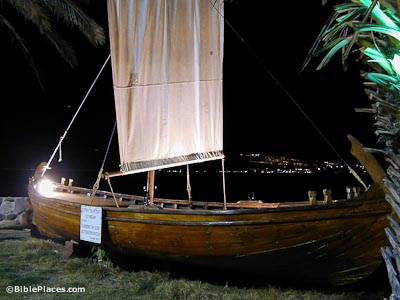
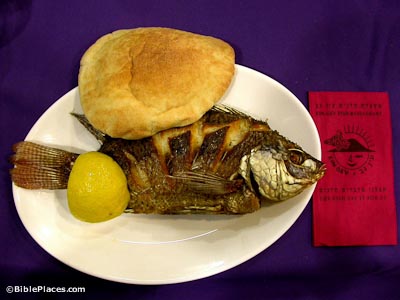
St. Peter’s Fish
Three types of fish were primarily sought by fishermen in antiquity in these waters. Sardines likely were the “two small fish” that the boy brought to the feeding of the 5,000. Sardines and bread were the staple product of the locals. Barbels are so known because of the barbs at the corners of their mouths. The third type is called musht but is more popularly known today as “St. Peter’s Fish.” This fish has a long dorsal fin which looks like a comb and can be up to 1.5 feet (0.5 m) long and 3.3 pounds (1.5 kg) in weight.
Sunset
The peaceful calm of the Sea of Galilee can quickly become transformed by a violent storm. Winds funnel through the east-west aligned Galilee hill country and stir up the waters quickly. More violent are the winds that come off the hills of the Golan Heights to the east. Trapped in the basin, the winds can be deadly to fishermen. A storm in March 1992 sent waves 10 feet (3 m) high crashing into downtown Tiberias and causing significant damage.
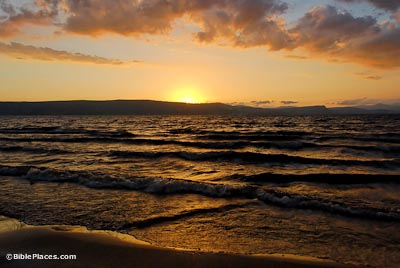
TruLight Ministry News

TruLight Ministries orders from God since 2012 . Teach Them , Comfort Them and Warn Them!
////////////
TruLight Ministries opdrag vanaf God sedert 2012. Leer hulle, Troos hulle en Waarsku hulle!
Pastoor Dirk se Audio Lering : Eindtyd Studie 3 van 11 .
TruLight School of Theology have started with Its daily Bible Study – Pastor Counselling Certificate – we are Starting with 36 Studies with 10 Studies per Topic from 1st of April 2025 – Over the Next 2 Years we will Include One Daily Study per Topic on this Platform. The Daily Manna Bible Study will be Available in English and Afrikaans!
We will Start with a 68 week Study on “Know Your Bible” Daily Bible Summaries of every Chapter in the Bible! From the Old Testament to the New Testament , from Genesis to Revelation 66 Books of the Bible.
Started 1st April 2025
This is our Study Principals:
SOAP
Scripture: Read a short passage out loud.
Observation: What do you notice about the verses?.
Application: How can you apply this to your life?.
Prayer: Pray about what you’ve learned.
REAP
Read: Read the passage carefully.
Engage: Ask questions about the passage.
Apply: Think about how the passage applies to your life.
Pray: Pray about what you’ve learned.
Introduction to the Bible – Bible Summary
Summary of the Gospel of John
Author: John 21:20–24 describes the author of the gospel of John as “the disciple whom
Jesus loved,” and for both historical and internal reasons this is understood to be John
the Apostle, one of the sons of Zebedee (Luke 5:10).
Date of Writing: Discovery of certain papyrus fragments dated around AD 135 require
the gospel of John to have been written, copied, and circulated before then. And, while
some think it was written before Jerusalem was destroyed (AD 70), AD 85—90 is a more
accepted time for the writing of the gospel of John.
Purpose of Writing: The author cites the purpose of the gospel of John as follows: “But
these are written that you may believe that Jesus is the Christ, the Son of God, and that
believing you may have life in His name” (John 20:31, NKJV). Unlike the three Synoptic
Gospels, John’s purpose is not to present a chronological narrative of the life of Christ
but to display His deity. John sought to strengthen the faith of second-generation
believers and bring about faith in others, but he also sought to correct a false teaching
that was spreading in the first century. John emphasized Jesus Christ as “the Son of
God,” fully God and fully man, contrary to a false doctrine that taught the “Christ-spirit”
came upon the human Jesus at His baptism and left Him at the crucifixion.
Key Verses:
“In the beginning was the Word, and the Word was with God, and the Word was God. . .
. And the Word became flesh and dwelt among us, and we beheld His glory, the glory as
of the only begotten of the Father, full of grace and truth” (John 1:1, 14, NKJV).
“The next day John saw Jesus coming toward him, and said, ‘Behold! The Lamb of God
who takes away the sin of the world!’” (John 1:29, NKJV).
“For God so loved the world that He gave His only begotten Son, that whoever believes
in Him should not perish but have everlasting life” (John 3:16, NKJV).
“Jesus answered and said to them, ‘This is the work of God, that you believe in Him
whom He sent’” (John 6:29, NKJV).
“The thief does not come except to steal, and to kill, and to destroy. I have come that
they may have life, and that they may have it more abundantly” (John 10:10, NKJV).
“And I give them eternal life, and they shall never perish; neither shall anyone snatch
them out of My hand” (John 10:28, NKJV).
“Jesus said to her, ‘I am the resurrection and the life. He who believes in Me, though he
may die, he shall live. And whoever lives and believes in Me shall never die. Do you
believe this?’”(John 11:25–26, NKJV).
“By this all will know that you are My disciples, if you have love for one another” (John
13:35, NKJV).
“Jesus said to him, ‘I am the way, the truth, and the life. No one comes to the Father
except through Me’” (John 14:6, NKJV).
“Jesus said to him, ‘Have I been with you so long, and yet you have not known Me,
Philip? He who has seen Me has seen the Father; so how can you say, “Show us the
Father”?’” (John 14:9, NKJV).
“Sanctify them by Your truth. Your word is truth” (John 17:17, NKJV).
“So when Jesus had received the sour wine, He said, ‘It is finished!’ And bowing His
head, He gave up His spirit” (John 19:30, NKJV).
“Jesus said to him, ‘Thomas, because you have seen Me, you have believed. Blessed are
those who have not seen and yet have believed’” (John 20:29, NKJV).
Brief Summary: The gospel of John includes only seven miracles—John calls them
“signs”—to demonstrate the deity of Christ and illustrate His ministry. Some of these
miracles and stories, such as the raising of Lazarus, are found only in John. His is the
most theological of the four Gospels, and he often gives the reason behind events
mentioned in the other gospels. The gospel of John shares much about the approaching
ministry of the Holy Spirit after Jesus’ ascension. There are certain words or phrases that
create a recurring theme in the gospel of John: believe, witness, Comforter, life –
death, light – darkness, I am, and love.
The gospel of John introduces Jesus Christ, not from His birth, but from “the beginning,”
before creation. John calls Jesus “the Word” (Logos) who, as God Himself, was involved
in every aspect of creation (John 1:1–3) and who later became flesh (verse 14) in order
that He might take away our sins as the spotless Lamb of God (verse 29). The gospel of
John includes several spiritual conversations, such as Jesus’ talk with the Samaritan
woman that shows Him as the Messiah (John 4:26) and Jesus’ meeting with Nicodemus
that explains salvation through His vicarious death on the cross (John 3:14–16). In the
gospel of John, Jesus repeatedly angers the Jewish leaders by correcting them (John
2:13–16); healing on the Sabbath, and claiming traits belonging only to God (John
5:18; 8:56–59; 9:6, 16; 10:33).
The last nine chapters of the gospel of John deal with the final week of Jesus’ life. Jesus
prepares His disciples for His coming death and for their ministry after His resurrection
and ascension (John 14–17). He then willingly dies on the cross in our place (John 10:15–
18), paying our sin debt in full (John 19:30) so that whoever trusts in Him will be saved
(John 3:14–16). Jesus then rises from the dead, convincing even the most doubting of
His disciples that He is God and Master (John 20:24–29).
Connections: The gospel of John’s portrayal of Jesus as the God of the Old Testament is
seen most emphatically in the seven “I Am” statements of Jesus. He is the “Bread of life”
(John 6:35), provided by God to feed the souls of His people, just as He provided manna
from heaven to feed the Israelites in the wilderness (Exodus 16:11–36). Jesus is the “Light
of the world” (John 8:12), the same Light that God promised to His people in the Old
Testament (Isaiah 30:26; 60:19–22) and which will find its culmination in the New
Jerusalem when Christ the Lamb will be its Light (Revelation 21:23). Two of the “I Am”
statements refer to Jesus as both the “Good Shepherd” and the “Door of the sheep.”
Here are clear references to Jesus as the God of the Old Testament, the Shepherd of
Israel (Psalm 23:1; 80:1; Jeremiah 31:10; Ezekiel 34:23) and, as the only Door into the
sheepfold, the only way of salvation.
The Jews believed in the resurrection and, in fact, used the doctrine to try to trick Jesus
into making statements they could use against Him. But His statement at the tomb of
Lazarus, “I am the resurrection and the life” (John 11:25), must have astounded them. He
was claiming to be the cause of resurrection and in possession of the power of life and
death. None other than God Himself could claim such a thing. Similarly, Jesus’ claim to
be “the way, the truth and the life” (John 14:6) linked Him unmistakably to the Old
Testament. His is the “Way of Holiness” prophesied in Isaiah 35:8; He established the
City of Truth of Zechariah 8:3 when He was in Jerusalem and preached the truths of the
gospel. As “the Life,” Jesus affirms His deity, the Creator of life, God incarnate (John 1:1–
3; Genesis 2:7). Finally, as the “true Vine” (John 15:1, 5), Jesus identifies Himself with the
nation of Israel, who are called the vineyard of the Lord in many Old Testament
passages. As the true Vine of the vineyard of Israel, He portrays Himself as the Lord of
the “true Israel”—all those who would come to Him in faith (cf. Romans 9:6).
Practical Application: The gospel of John continues to fulfill its purpose of evangelizing
the lost (John 3:16 is likely the best-known Bible verse) and is often used in evangelistic
Bible studies. In the recorded encounters between Jesus and Nicodemus and the woman
at the well (chapters 3—4), we learn much from Jesus’ model of personal evangelism.
His comforting words to His disciples before His death (John 14:1–6, 16; 16:33) are still
of great comfort in sorrowful times. Jesus’ “high priestly prayer” for believers in chapter
17 is also a wonderful source of encouragement for believers. John’s teachings
concerning the deity of Christ (John 1:1–3, 14; 5:22–23; 8:58; 14:8–9; 20:28) are helpful in
apologetics and provide a clear revelation of who Jesus is: fully God and fully man.
Inleiding tot die Bybel – Bybel Samevatting
Opsomming van die Evangelie
van Johannes
Skrywer: Johannes 21:20–24 beskryf die skrywer van die evangelie van Johannes as “die
dissipel vir wie Jesus liefgehad het,” en om beide historiese en interne redes word dit
verstaan as Johannes die Apostel , een van die seuns van Sebedeus ( Luk. :10 ).
Skrywedatum: Die ontdekking van sekere papirusfragmente wat rondom 135 nC
gedateer is, vereis dat die evangelie van Johannes voor dan geskryf, gekopieer en
gesirkuleer is. En terwyl sommige dink dat dit geskryf is voordat Jerusalem vernietig is
(70 nC), is 85-90 nC ‘n meer aanvaarde tyd vir die skryf van die evangelie van Johannes.
Doel van die skrywe: Die skrywer haal die doel van die evangelie van Johannes soos
volg aan: “Maar dit is beskrywe dat julle kan glo dat Jesus die Christus is, die Seun van
God, en dat julle deur te glo die lewe in sy Naam kan hê” ( Joh. 20:31 ). Anders as die
drie Sinoptiese Evangelies , is Johannes se doel nie om ‘n chronologiese verhaal van die
lewe van Christus aan te bied nie, maar om Sy godheid te vertoon. Johannes het
probeer om die geloof van tweedegenerasie-gelowiges te versterk en geloof in ander te
bewerkstellig, maar hy het ook probeer om ‘n valse lering wat in die eerste eeu versprei
het, reg te stel. Johannes het Jesus Christus beklemtoon as “die Seun van God,” ten volle
God en ten volle mens, in teenstelling met ‘n valse leerstelling wat geleer het dat die
“Christus-gees” op die mens Jesus gekom het tydens Sy doop en Hom by die kruisiging
verlaat het.
Sleutelverse:
“In die begin was die Woord, en die Woord was by God, en die Woord was God. . . . En
die Woord het vlees geword en het onder ons gewoon, en ons het sy heerlikheid
aanskou, die heerlikheid van die Eniggeborene van die Vader, vol van genade en
waarheid” ( Joh. 1:1 , 14 ).
“Die volgende dag het Johannes Jesus na hom sien kom en gesê: Kyk! Die Lam van God
wat die sonde van die wêreld wegneem!’” ( Johannes 1:29 , OAV).
“Want so lief het God die wêreld gehad dat Hy sy eniggebore Seun gegee het, sodat
elkeen wat in Hom glo, nie verlore mag gaan nie, maar die ewige lewe kan hê” (
Johannes 3:16 ).
“Jesus antwoord en sê vir hulle: Dit is die werk van God, dat julle in Hom glo wat Hy
gestuur het” ( Johannes 6:29 ).
“Die dief kom nie behalwe om te steel en om te slag en om te verwoes nie. Ek het
gekom sodat hulle die lewe kan hê en dit in oorvloed” ( Johannes 10:10 ).
“En Ek gee hulle die ewige lewe, en hulle sal nooit verlore gaan tot in ewigheid nie; en
niemand sal hulle uit my hand ruk nie” ( Johannes 10:28 , OAV).
“Jesus sê vir haar: Ek is die opstanding en die lewe. Wie in My glo, sal lewe al sterf hy. En
elkeen wat lewe en in My glo, sal in ewigheid nooit sterwe nie. Glo jy dit?’” ( Johannes
11:25–26 , OAV).
“Hieraan sal almal weet dat julle my dissipels is, as julle liefde vir mekaar het” ( Joh 13:35
).
“Jesus sê vir hom: Ek is die weg en die waarheid en die lewe. Niemand kom na die Vader
behalwe deur My nie’” ( Johannes 14:6 , OAV).
“Jesus sê vir hom: Is Ek so lank by jou en ken jy My nie, Filippus? Hy wat My gesien het,
het die Vader gesien; so hoe kan jy sê: “Toon ons die Vader”?’” ( Johannes 14:9 , OAV).
“Heilig hulle deur U waarheid. U woord is waarheid” ( Johannes 17:17 , OAV).
“Toe Jesus dus die suur wyn ontvang het, het Hy gesê: Dit is volbring! En Hy het sy hoof
gebuig en sy gees gegee” ( Johannes 19:30 , OAV).
“Jesus sê vir hom: Thomas, omdat jy My gesien het, het jy geglo. Salig is die wat nie
gesien het nie en tog geglo het” ( Joh. 20:29 ).
Kort opsomming: Die evangelie van Johannes sluit slegs sewe wonderwerke in –
Johannes noem dit “tekens” – om die godheid van Christus te demonstreer en Sy
bediening te illustreer. Sommige van hierdie wonderwerke en verhale, soos die
opwekking van Lasarus, word slegs in Johannes gevind. Syne is die mees teologiese van
die vier Evangelies, en hy gee dikwels die rede vir gebeure wat in die ander evangelies
genoem word. Die evangelie van Johannes deel baie oor die naderende bediening van
die Heilige Gees na Jesus se hemelvaart. Daar is sekere woorde of frases wat ‘n
herhalende tema in die evangelie van Johannes skep: glo , getuig , Trooster , lewe – dood
, lig – duisternis , Ek is , en liefde .
Die evangelie van Johannes stel Jesus Christus bekend, nie vanaf Sy geboorte nie, maar
van “die begin,” voor die skepping. Johannes noem Jesus “die Woord” ( Logos ) wat, as
God self, betrokke was by elke aspek van die skepping ( Joh. 1:1–3 ) en wat later vlees
geword het (vers 14) sodat Hy ons sondes kan wegneem as die vlekkelose Lam van God
(vers 29). Die evangelie van Johannes sluit verskeie geestelike gesprekke in, soos Jesus
se gesprek met die Samaritaanse vrou wat Hom as die Messias wys ( Joh. 4:26 ) en Jesus
se ontmoeting met Nikodemus wat redding deur Sy plaasvervangende kruisdood
verduidelik ( Joh. 3: 14–16 ). In die evangelie van Johannes maak Jesus die Joodse leiers
herhaaldelik kwaad deur hulle te korrigeer ( Joh. 2:13–16 ); genesing op die Sabbat, en
aanspraak maak op eienskappe wat net aan God behoort ( Joh. 5:18 ; 8:56–59 ; 9:6 , 16 ;
10:33 ).
Die laaste nege hoofstukke van die evangelie van Johannes handel oor die laaste week
van Jesus se lewe. Jesus berei Sy dissipels voor vir Sy komende dood en vir hulle
bediening ná Sy opstanding en hemelvaart ( Joh. 14–17 ). Hy sterf dan gewillig aan die
kruis in ons plek ( Joh. 10:15–18 ), en betaal ons sondeskuld ten volle ( Joh. 19:30 ) sodat
elkeen wat op Hom vertrou, gered sal word ( Joh. 3:14–16 ). Jesus staan dan op uit die
dood en oortuig selfs die mees twyfelende van Sy dissipels dat Hy God en Meester is (
Joh. 20:24–29 ).
Verbindings: Die evangelie van Johannes se uitbeelding van Jesus as die God van die
Ou Testament word die nadruklikste gesien in die sewe “Ek Is” stellings van Jesus. Hy is
die “Brood van die lewe” ( Joh. 6:35 ), deur God voorsien om die siele van Sy volk te
voed, net soos Hy manna uit die hemel voorsien het om die Israeliete in die woestyn te
voed ( Eksodus 16:11–36 ). Jesus is die “Lig vir die wêreld” ( Joh. 8:12 ), dieselfde Lig wat
God aan Sy mense in die Ou Testament belowe het ( Jesaja 30:26 ; 60:19–22 ) en wat sy
hoogtepunt in die Nuwe sal vind. Jerusalem wanneer Christus die Lam sy lig sal wees (
Openbaring 21:23 ). Twee van die “Ek Is”-stellings verwys na Jesus as beide die “Goeie
Herder” en die “Deur van die skape”. Hier is duidelike verwysings na Jesus as die God
van die Ou Testament, die Herder van Israel ( Ps 23:1 ; 80:1 ; Jeremia 31:10 ; Esegiël
34:23 ) en, as die enigste Deur in die skaapkraal, die enigste weg van verlossing.
Die Jode het in die opstanding geglo en het in werklikheid die leerstelling gebruik om
Jesus te probeer mislei om stellings te maak wat hulle teen Hom kon gebruik. Maar Sy
stelling by die graf van Lasarus, “Ek is die opstanding en die lewe” ( Joh. 11:25 ), moes
hulle verstom het. Hy het beweer dat hy die oorsaak van opstanding was en in besit was
van die krag van lewe en dood. Niemand anders as God self kon so iets aanspraak maak
nie. Net so het Jesus se aanspraak dat hy “die weg, die waarheid en die lewe” is ( Joh.
14:6 ) Hom onmiskenbaar aan die Ou Testament gekoppel. Syne is die “Weg van
Heiligheid” wat in Jesaja 35:8 geprofeteer word ; Hy het die Stad van Waarheid van
Sagaria 8:3 gestig toe Hy in Jerusalem was en die waarhede van die evangelie verkondig
het. As “die Lewe”, bevestig Jesus Sy godheid, die Skepper van lewe, God geïnkarneer (
Joh. 1:1–3 ; Genesis 2:7 ). Ten slotte, as die “ware Wingerdstok” ( Joh. 15:1 , 5 ),
identifiseer Jesus Homself met die nasie Israel, wat in baie Ou Testamentiese gedeeltes
die wingerd van die Here genoem word. As die ware Wingerdstok van die wingerd van
Israel, beeld Hy Homself uit as die Here van die “ware Israel” – almal wat in geloof na
Hom toe sou kom (vgl. Romeine 9:6 ).
Praktiese toepassing: Die evangelie van Johannes vervul steeds sy doel om verlorenes
te evangeliseer ( Johannes 3:16 is waarskynlik die bekendste Bybelvers) en word dikwels
in evangelistiese Bybelstudies gebruik. In die opgetekende ontmoetings tussen Jesus en
Nikodemus en die vrou by die put (hoofstukke 3-4), leer ons baie uit Jesus se model van
persoonlike evangelisasie. Sy vertroostende woorde aan Sy dissipels voor Sy dood ( Joh.
14:1–6 , 16 ; 16:33 ) is steeds tot groot vertroosting in hartseer tye. Jesus se
“hoëpriesterlike gebed” vir gelowiges in hoofstuk 17 is ook ‘n wonderlike bron van
bemoediging vir gelowiges. Johannes se leringe aangaande die godheid van Christus (
Joh. 1:1–3 , 14 ; 5:22–23 ; 8:58 ; 14:8–9 ; 20:28 ) is nuttig in apologetiek en verskaf ‘n
duidelike openbaring van wie Jesus is : volkome God en volkome mens .
We are Currently reading and Listening to the Bible, a Chapter a Day !
The total number of chapters in the Bible is 1,189. There are 929 chapters within 39 books of the Old Testament and 260 chapters within the 27 books of the New Testament.
Genesis 48 / 49 / 50 English – Follow the Reading in Your Bible.
Genesis 48 / 49 / 50 Afrikaans – Volg die Leser in u Bybel.
Something New Coming June 2025 to this APP

Healing Articles Coming soon
Share this Feeding of Manna with your Friends and Family. just click on the Social Media icon and share !